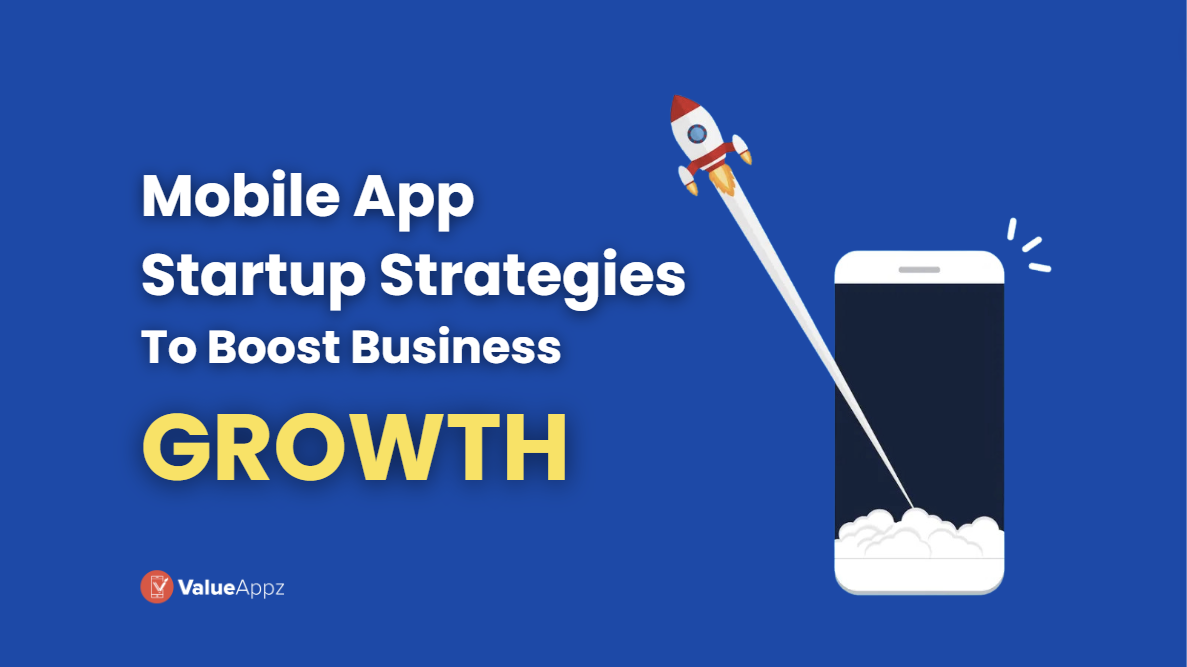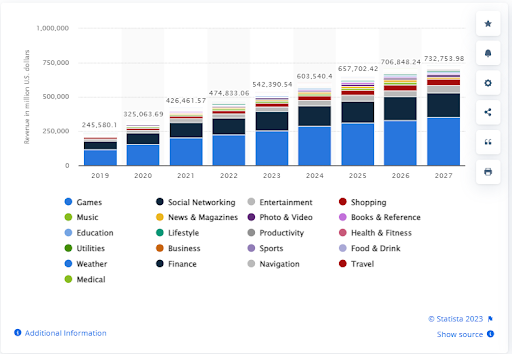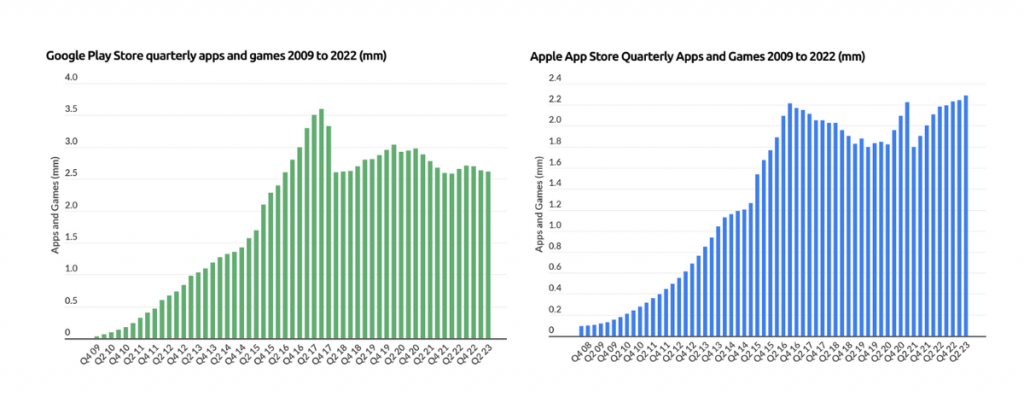15 Proven Mobile App Startup Strategies to Boost Your Brand

Quick Summary: One reason that top brands have been able to take the top place is their unique strategies. What methods should you follow as a mobile app startup to gain a place? This blog will discuss the 15 most important strategies that will help your brand grow right from the start.
Are you an entrepreneur or a business owner looking to launch your mobile app startup? Do you want to create a well-crafted app that resonates with your audience and takes your brand to the next level? If yes, then this guide is tailor-made for you!
A fun fact: As per a report, on average, about 2,036 apps are released daily on Google Play. Isn’t that shocking? The reports also show there are currently 8.93 million apps available on iOS and Android app stores.
As seen in the stats above, we know the app market is highly competitive, and standing out from the crowd can be a daunting task. But fear not; we’ve got you covered. In this comprehensive guide, we’ll dive into 15 proven mobile app startup strategies that can help your app gain traction and connect with users.
Take a look at the TOC to check out the strategies quickly.
Table of Contents
15 Mobile App Startup Strategies to Boost Your Brand
So, what are these strategies that will ensure that your mobile app startup does not fail? Check out these one by one for guaranteed success.
1. Determine Your Startup Niche
If you are planning to start a mobile app startup, the first step you need to take is to determine your business niche. It will help you to understand which industry can be the most profitable and relevant for your business.
To better understand, you can refer to the revenue generated by various industries over the years. It will give you a broader perspective on what niche to choose for your startup.

Source: Statista
Besides, choosing a niche also depends on your business goals and objectives. If you have an existing business, you can convert it into an online platform. It is essential to choose a niche that has a demand in the market, a proper target audience and is profitable for your brand.
Confused about what business startup you should invest in? Check our guide on the top online business ideas.
2. Identify Your Target Market Clearly
Identifying your target market is a crucial step towards the success of your mobile app. It helps you tailor your features, customize your offerings, market effectively, minimize resource waste, and build customer loyalty.

Knowing your target market is crucial for startups with limited resources. The clearer your understanding of your target market, the more effectively you can create an app that resonates with and caters to their specific needs.
For instance, if you are in the food delivery business, your target audience will be those who prefer getting their food delivered home than dining out. Hence, you know what features you need to add in order to solve their problem.
Here are some steps to help you identify your target audience:
- Conduct market research to gather data on your industry, competitors, and potential customer base.
- Create detailed customer personas that represent your ideal users.
- Analyze existing customer data (if applicable) to identify common traits and preferences.
- Understand the problems or challenges your target audience faces that your mobile app can solve.
- Segment your audience based on shared characteristics.
- Factor in the geographic location of your target audience if your app’s functionality is location-dependent.
- Consider lifestyle, values, interests, and personality traits to understand the psychographics of your target audience.
- To gain a better understanding of your potential audience’s preferences and habits, make use of insights gathered from social media.
- Engage with your target audience directly to gather feedback and insights.
- Participate in relevant online communities, forums, and social media groups where your target audience gathers.
- Keep an eye on trends and emerging technologies in your industry.
- Regularly revisit and refine your target audience profile to keep your mobile app relevant and appealing to your users.
Remember, understanding your target audience is an ongoing process. By following these steps, you can create a user-centric mobile app and effectively market it to your target audience.
3. Choosing the Right App Technology
Choosing the right platform for your mobile app is a crucial step in the development process. Whether your app targets Android, iOS, or both, several critical factors should be considered. The key factor is to conduct thorough research to determine which platform aligns best with your business goals and objectives.
As per a report by Business of Apps, Google Play had 110.1 billion app and game downloads in 2022. Annual downloads saw a massive jump in 2020, increasing by 28.4%. On the other hand, Apple’s App Store had 2.184 million apps and games in 2022, an increase of 21.4% from the previous year.

To make an informed decision, it’s essential to delve into factors like market share and revenue potential for Android and iOS. With a comprehensive understanding of these respective app stores, arriving at a conclusive decision would be easier. Carefully evaluate metrics such as the number of downloads and revenue models for each platform.
Assessing your options is key to choosing the right platform for your mobile app startup. This assessment will help you reach the widest audience and succeed in the highly competitive app market. It’s a thorough process that lays a strong foundation for your app’s potential.
4. Find the Right On Demand App Development Team
Now that you have chosen the ideal technology for your app startup, it’s time to focus on finding the best app development team possible. A team with strong skills and experience can lay a solid foundation for your app, ensuring that its functionality, performance, and scalability are optimized.
When choosing the right app development team, you need to consider a number of factors:
- Team’s expertise in your niche.
- Their experience.
- Cost of app development.
- Tools and technologies used.
- Mode of communication.
- Portfolio.
Finding the right team will help your mobile app startup get the right direction for its success. A company that has sufficient experience will ensure that your app is developed in the best quality, along with considering the budget that suits your business needs.
Are you searching for a reliable on demand app development partner? Look no further than ValueAppz. Our team of skilled professionals has a proven track record of helping startups succeed in the competitive app market. To learn more about our services, get in touch today.
5. User Experience Optimization
User experience is arguably the most critical factor for the mobile app startup’s success. Did you know that 88% of users are not likely to return after a bad user experience? Hence, you need to ensure that your mobile app provides an extremely engaging and seamless experience.
UI/UX is not just about the look. The users should not face any problems while moving from one feature to another. A simple yet intuitive design encourages users to engage with the app more frequently and for more extended periods, leading to increased user loyalty, attracting new users, and resulting in the startup’s success.
Some ways to ensure an intuitive user experience are:
- Clean and minimalist design
- Fast loading speed
- Clear and concise information
- User-friendly search and filtering options
- High-quality and engaging content
- Seamless integration with external services
6. Develop a Well-Defined Business Model
Another crucial mobile app startup strategy is to develop a well-defined business model. A robust business model will provide a clear roadmap for the app’s monetization, target audience, value proposition, and revenue models.
For example, suppose you are launching a startup in the on demand grocery delivery industry. In that case, you can choose between models like single-brand apps like Walmart or aggregator models like Instacart.
Choosing a suitable business model will depend on the types of services you want to lend, your target audience’s needs, and your business goals. Further, picking the right model will set a base for your app development for its design, features, and development.
If you’re struggling to choose a business model for your app startup, don’t worry. Our team is here to help you determine the best model that fits your goals and vision. Feel free to contact us for expert guidance, we’ll be happy to assist you.
7. Choose the Right Revenue Models
How can you earn money with a mobile app? Considering the right revenue models is another crucial strategy. Let’s take the example of business model of Uber Eats. This leading on demand food delivery platform follows various monetization methods like delivery fees, subscription plans, surge pricing, commission from restaurants, and more.
With this, it ensures that the brand generates good money while providing excellent services to its users.
Hence, if your startup belongs to another industry, you must look at the top brands to check what revenue models are successful and what your brand must adapt. Some of the common revenue models include the freemium model, subscription plans, commission from service providers, and surge pricing.
8. Pick Just the Right Features
One of the mistakes that startups make is picking all the features for their mobile app. As a beginner, you can add just the needed features and functionalities, and as the app grows and attracts more users, you may add additional features.
Overloading the app with features will affect the user experience as the app will be confusing. Advanced app features like social integration, various payment options, and AR/VR can be skipped at the beginning.
Here is a list of app features that you can add as a mobile app startup:
- User registration and profile
- Intuitive user interface
- Search and discovery
- Messaging and push notifications
- User reviews and ratings
- Content creation and sharing
- Analytics and insights
- Offline access to some features
- Customer support
- In-app purchase
9. Safeguard App Users’ Data
You should never be lenient with the users’ data as a brand. As per the reports of 2022, the most common concern among the users was being defrauded on mobile apps and their apps being hacked.
Such experiences will make the users lose their interest in brands that take minimal effort to safeguard their data. Hence, you must take proper precautions and security measures for data privacy.
10. Develop A Strong Marketing Plan
Your mobile app will not succeed if there is no strong marketing plan. You need to build solid plans to ensure that your app reaches the target market and engages most of the users.
As discussed in the points earlier, several mobile apps are launched daily. It’s the marketing plan that will set your brand apart from others. Your strategy should include highlighting the app’s USPs, features, and functionalities and why the target audience should download the app.
11. Maximize Your Brand Impact on Social Media
Social media is one such platform that no brand should skip, especially the startups. Platforms like Instagram, X, Facebook, etc., ensure that your voice reaches the target audience in this competitive market.
Besides brand awareness, these platforms also allow for smooth communication between the brand and its customers.
As of 2023, there are over 4.9 billion people using social media globally, and this number is expected to reach 5.85 billion by 2027. Seeing the numbers, what other ways can be better to reach your users?
12. Enhance the App Based on Users’ Feedback
Your mobile app should always be up to date. As the users start to engage with the app, there will be a lot of feedback and reviews. You must pay close attention to what the users say and improve your app accordingly.
It will showcase that you care about your target audience and are always willing to listen to their feedback. Also, it will ensure that the mobile app is updated with all the necessary features and changes that your audience needs.
13. Build A Retention Plan
Did you know that 56% of users uninstall the apps within 7 days? What’s the reason? It happens because of several factors like slow loading, boring UI/UX, loss of interest, etc., so what do you do about it?
If you don’t want your users to uninstall the app, you must continuously work on various things. Some strategies to include in your retention plan are:
- Personalize user experience
- Provide instant push-notifications
- Allow in-app messaging
- Provide responsive customer support
- Keep optimizing app performance
Following such strategies will guarantee that users stick to your app and do not lose interest, enhancing retention.
14. Invest in Analytics
For mobile app startup companies, strategic analytics investment is essential. Startups can make informed decisions and improve their app’s features, content, and user experience through analytics, which offers crucial insights into user behavior. Startups may enhance the performance of the app, increase user satisfaction, and boost retention rates by studying how users interact with it, including which features they use the most and where there may be friction.
Thanks to this data-driven approach, startups can identify patterns, find potential for monetization, and adjust their marketing strategy to target a larger audience. All the top brands in the mobile app industry use data analytics tools to guarantee that their app succeeds in every way possible.
Launch Your Mobile App Startup With ValueAppz
Finding the perfect on demand app development company is one of the most crucial mobile app startup strategies.
With years of experience and a strong portfolio, ValueAppz is your best choice for app development. We have helped various startups worldwide to convert their ideas into a reality. Our cutting-edge technology, talented resources, and understanding of the startups set us apart from other companies.
Contact our professionals now to discuss your mobile app idea.
Key Takeaways
- Your mobile app startup’s success depends on finding a lucrative and popular niche. When selecting a niche, consider market demand, your target market, and profitability.
- To meet their demands and make sure your app is successful, clearly defining your target audience is crucial. Recognize the needs and preferences of your users so that you can modify your app appropriately.
- Understanding your audience, competitors, and trends requires thorough market research. To track user feedback and potential for development, this study should continue long after the app’s release.
- A seamless and enjoyable user experience is essential since it greatly impacts user retention. To increase customer happiness and loyalty, prioritize design, speed, user-friendliness, and integration with external services.
Frequently Asked Questions
Q1. How Can I Make My Mobile App Successful?
To make your mobile app a success, focus on recognizing the needs of the target audience and continuously iterate and improve based on their feedback.
Q2. How Do I Market My Startup Mobile App?
You can follow various marketing strategies to market your mobile app startup, like social media, content marketing, app store optimization, etc.
Q3. How Important is Market Research for a Mobile App Startup’s Success?
Market research is crucial and one of the first strategies for mobile app startups to follow. It will help you understand your target audience and their preferences and provide a clear picture of the next steps.
Q4. How Can A Mobile App Startup Effectively Monetize Its App?
A mobile app startup can generate money by following various monetization methods like in-app purchases, subscription plans, ads, delivery apps, etc.
Q5. What Role Does Mobile App Branding Play in the Success of A Startup?
Mobile app branding plays a very crucial role in the app’s success as it helps create a distinct identity, build trust and credibility among users, and differentiate the app from its competitors.
Q6. What Are The Key Strategies for Launching a Successful Mobile App Startup?
The critical mobile app startup strategies include market research, designing a user-centric app, implementing effective user acquisition strategies, and continuously improving the app based on users’ feedback.
THE AUTHOR
Amrita Singh
With a background in Digital Marketing spanning over five years, I bring a unique perspective to my writing and have developed a keen understanding of the ever-evolving digital landscape. I focus on creating content that is relevant and easy to understand.

Get ready to digitally transform your business.
Let our team help take your business to the next level. Contact us today to get started on finding the perfect solutions for your business needs.







